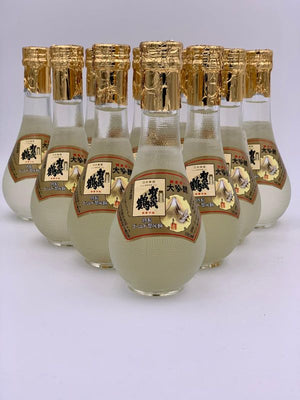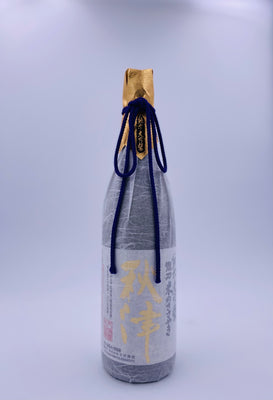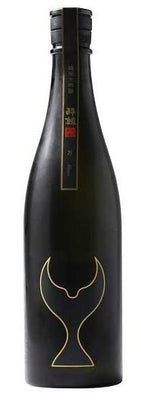
One of our suppliers recently invited us to a private Premium Sake tasting, where we sampled many Sakes from $50 to $600. This was one of the surprises of the tasting and comes in at a bit lower pricing than what we typically offer. This Yamahai Junmai is a unique sake produced by the Shirakabegura brewery, located in Nada, Hyogo prefecture, a district of Kobe and one of Japan's most esteemed sake-producing regions, and is aged 10 years before it was released. The brewery, established in 1899, is known for its traditional sake-making techniques and its use of ultra-high-quality ingredients (their flagship sake is the purest example we have ever tasted, and this takes a page out of that book). This starts with Organic Yamada Nishiki rice that is polished down to 60% with the brewing water specifically sourced from the Rokko mountains, which is known for its purity and excellent mineral content. It is made using the Yamahai method, which creates a similar style to the Kimoto method but is slightly less labor intensive and involves a natural lactic acid fermentation process without adding commercial lactic acid. This technique requires more time and skill, resulting in a sake with deeper and more complex flavors, and takes 3-4 weeks to complete the fermentation. The Yamahai method fosters a natural fermentation environment, leading to a robust yeast development that enhances the sake's complexity, just like a wild yeast fermentation in winemaking. After fermentation, the sake is then aged in clay pots at frigid temperatures close to freezing for a decade before being released. This process is uncommon in Japan, and only in recent years has it caught on due to a law change. Previously, it was not lucrative for brewers to age sake due to laws requiring them to pay taxes on the entire production after it is made, not just when it is sold, making it a significant investment for a return ten years later. The aging process, however, helps create a more complex, deep, rich, umami, and smooth sake, which is more apparent at lower polishing, like the Junmai level, which is why this is only 60% polished. Usually, there is an oxidative element to this style, but this was so incredibly pure we couldn't believe it had been aged that long. It has a fantastic balance of fruit and savoriness with a nuanced nose showing notes of Asian pear, custard, oranges, cream, subtle ripe banana, and floral jasmine. The gently mouthwatering palate has a creamy mouthfeel and a wonderful, silky texture with melon, vanilla, banana, and cream flavors. The finish is very long and savory, showing cocoa, plantain, sea salt, mouthwatering acidity, and crushed-rock minerality. As it opens up and gets closer to room temperature, it becomes even more savory, with an added minty flavor enhancing its complexity. This is sensational and we have some of the only bottles available for retail.
Shirakabegura Yamahai Junmai Aged 10 Years
Shirakabegura Yamahai Junmai Aged 10 Years
One of our suppliers recently invited us to a private Premium Sake tasting, where we sampled many Sakes from $50 to $600. This was one of the surprises of the tasting and comes in at a bit lower pricing than what we typically offer. This Yamahai Junmai is a unique sake produced by the Shirakabegura brewery, located in Nada, Hyogo prefecture, a district of Kobe and one of Japan's most esteemed sake-producing regions, and is aged 10 years before it was released. The brewery, established in 1899, is known for its traditional sake-making techniques and its use of ultra-high-quality ingredients (their flagship sake is the purest example we have ever tasted, and this takes a page out of that book). This starts with Organic Yamada Nishiki rice that is polished down to 60% with the brewing water specifically sourced from the Rokko mountains, which is known for its purity and excellent mineral content. It is made using the Yamahai method, which creates a similar style to the Kimoto method but is slightly less labor intensive and involves a natural lactic acid fermentation process without adding commercial lactic acid. This technique requires more time and skill, resulting in a sake with deeper and more complex flavors, and takes 3-4 weeks to complete the fermentation. The Yamahai method fosters a natural fermentation environment, leading to a robust yeast development that enhances the sake's complexity, just like a wild yeast fermentation in winemaking. After fermentation, the sake is then aged in clay pots at frigid temperatures close to freezing for a decade before being released. This process is uncommon in Japan, and only in recent years has it caught on due to a law change. Previously, it was not lucrative for brewers to age sake due to laws requiring them to pay taxes on the entire production after it is made, not just when it is sold, making it a significant investment for a return ten years later. The aging process, however, helps create a more complex, deep, rich, umami, and smooth sake, which is more apparent at lower polishing, like the Junmai level, which is why this is only 60% polished. Usually, there is an oxidative element to this style, but this was so incredibly pure we couldn't believe it had been aged that long. It has a fantastic balance of fruit and savoriness with a nuanced nose showing notes of Asian pear, custard, oranges, cream, subtle ripe banana, and floral jasmine. The gently mouthwatering palate has a creamy mouthfeel and a wonderful, silky texture with melon, vanilla, banana, and cream flavors. The finish is very long and savory, showing cocoa, plantain, sea salt, mouthwatering acidity, and crushed-rock minerality. As it opens up and gets closer to room temperature, it becomes even more savory, with an added minty flavor enhancing its complexity. This is sensational and we have some of the only bottles available for retail.






